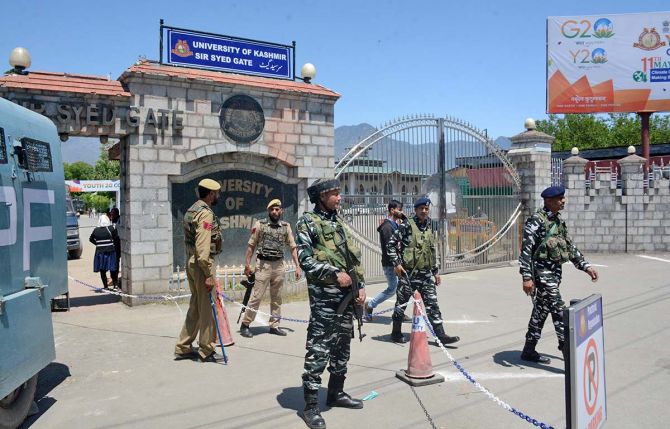The best, wisest, and fairest next step in strengthening our own cause is to restore statehood to Jammu and Kashmir and allow the resumption of robust political activity.
That's a box that remains unchecked on the Modi government's report card as we approach the fourth anniversary of Kashmir's Constitutional shift, notes Shekhar Gupta.

It is in the nature of the news cycle that the only aspect of the G20 event (third tourism working group) in Srinagar in May that made serious headlines was the absence of China, Turkey, Saudi Arabia, Egypt, and Oman.
These abstentions were a bummer. But the larger outcome was significantly positive in political and strategic terms.
That is easy and safe to deduce from the fact that 17 of the 20 G20 countries attended, including four of the P-5, all of Europe and, indeed, the largest Muslim nation, Indonesia.
That all of these shed the 'disputed region' shibboleth on Jammu and Kashmir is a sizeable turning point in the fraught 75-year history of the region.
This is progress, and we must savour it. But we also shouldn't shy away from wading into some complexities and unfinished projects.
First the abstentions, the issues they underline, and the reminders they serve about the unfinished 'business' in Jammu and Kashmir.
Even if we toss China and Turkey as the usual suspects, the absence of the three important Arab nations was a significant setback.
Of course, only one of these, Saudi Arabia, is a G20 member. The other two are invitees.
This needs to be noted especially because Saudi Arabia and India have seen a warming up in the past 15 years that's of epochal significance.
The I2U2 (India, Israel, the UAE, the USA) grouping has come up in its neighbourhood, with its blessings. Oman has had the oldest friendly ties with India.
And silly Egypt? They don't even have the pretence of being an Islamic State even in the limited sense of what Recep Tayyip Erdogan is turning Turkey into.
Quite to the contrary, while Mr Erdogan has patronised the Muslim Brotherhood, Abdel Fattah el-Sisi has risen to dictatorial power by crushing them and their elected government.
India's outreach to Cairo has been strong and aggressive -- President el-Sisi was the Republic Day chief guest this year. Prime Minister Narendra D Modi visited Egypt last month.
What, then, persuaded Egypt to more or less join the bandwagon of the delusional OIC (Organisation of Islamic Cooperation) on Kashmir?
The Pakistanis were hard at work here. Their foreign minister, Bilawal Bhutto Zardari, had boasted in Goa there would be 'significant abstentions' at the Srinagar event.
Three Islamic nations staying out will only be a partial achievement for him because many others, including the UAE, attended.
The abstentions, however, served a purpose for Pakistan, and were a reminder to India.
They did not use the words of the Chinese ('we do not go to events in disputed territories'), but conveyed the same message.
That, weeks before the fourth anniversary of the Constitutional changes in Jammu and Kashmir, the issue is far from settled for a section of the world matters for India.
It's also an instrument in the hands of China to triangulate India through Pakistan.
It was also a reminder that while much progress has been made, India would err by declaring victory too soon.
A new chapter was written with the Constitutional changes on August 5, 2019, and much has been achieved on the ground, especially in the Valley, from law and order to infrastructure building.
Yet, some of the chapters that should have followed that first in the Modi era haven't been written.
It is as if the authors suddenly got writer's block.
The most politically, strategically and internationally significant of these is the continued Union Territory status of the erstwhile state, albeit with special rights.
Four years after the shift, the 'state' continues to be ruled directly by the Centre and the political process would still be held in abeyance.

In one of his addresses following the changes, Prime Minister Modi had also talked about restoring Jammu and Kashmir's statehood.
And holding a fresh election, you'd think.
If this hasn't happened with just months to go for the next general election process to begin, and there is no talk of this either, it is a letdown.
A letdown not just for the people of Kashmir, but the larger Indian cause as well.
To understand why this is such a letdown, take your mind back to the decades when the 'Kashmir Dispute' painted disturbingly on the world's radar screen.
We don't need to go back to 1948 (ceasefire and UN Security Council resolutions) or 1972 (Simla Agreement). A much better place to begin would be late 1989.
That is when the ongoing (though now greatly subdued) separatist insurgency actively backed by Pakistan began.
By 1991, when P V Narasimha Rao took charge and began cleaning up the mess left behind by V P Singh, who ran our weakest government on national security yet, Pakistan had been able to fully internationalise the issue.
Pakistan's campaign was three-pronged: Violation of human rights, the state being under military occupation, and denial of democracy and the right to self-determination.
Translated, it pushed the clock back to the UN Security Council resolutions and the plebiscite.
Rao countered it in exactly the way his predecessors had done, but with greater confidence and moral strength.
Where was the justification for any plebiscite when the Kashmiris were voting in increasing numbers to elect their own governments?
Isn't that self-determination and democracy? Of course, there were juicy comparisons to make with the state of democracy in all of Pakistan, not just the part of Kashmir under its occupation.
His greater confidence came from the fact that India had begun holding fair elections in Kashmir unlike the fixed ones in the past, 1987 being the most recent then.
Rao also countered pressures on human rights by setting up the National Human Rights Commission and lifting the ban on foreign journalists visiting the state.
Today, India is much stronger than under Rao.
First it is the economic heft built in the past three decades and then the rise of a full-majority Right-nationalist government under Modi in 2014.
Geo-strategic changes, the malevolent rise of China, a warring Russia, and the Indian embrace of the US have all placed India in the sweetest spot in history yet.
This is the time and opportunity to push the planned and promised moves. Not when this cycle might turn. And turn it might. In global affairs, the balance of power, alliances, all shift constantly.
India has worked hard at earning this sweet spot. And it is the reason none of the world powers and significant nations (toss China and Turkey, as we said) is raising any questions about the changes to Kashmir's Constitutional status.
But, it is risky -- and unnecessary -- to get complacent.

The idea that Jammu and Kashmir can be governed from New Delhi for eternity is tempting, especially to those in control.
If you get used to this headiness, however, you have been skating on thin ice for too long.
The five countries who abstained reminded us that they still see Kashmir as a 'dispute'.
Many of the others don't say it, but none says the dispute ended on August 5, 2019.
Even our 'natural strategic ally', the US, passes resolutions asserting that all of Arunachal Pradesh is part of India, rejecting Chinese claims, but is silent on Ladakh/Aksai Chin.
In diplomacy, rude things are mostly not said in public, and possibly not in private either for long periods.
But even the Americans see Ladakh as part of a territory about which there is a dispute and where they haven't accepted India's claims.
The best, wisest, and fairest next step in strengthening our own cause is to restore statehood to Jammu and Kashmir and allow the resumption of robust political activity.
That's a box that remains unchecked on the Modi government's report card as we approach the fourth anniversary of Kashmir's Constitutional shift.
By Special Arrangement with The Print











